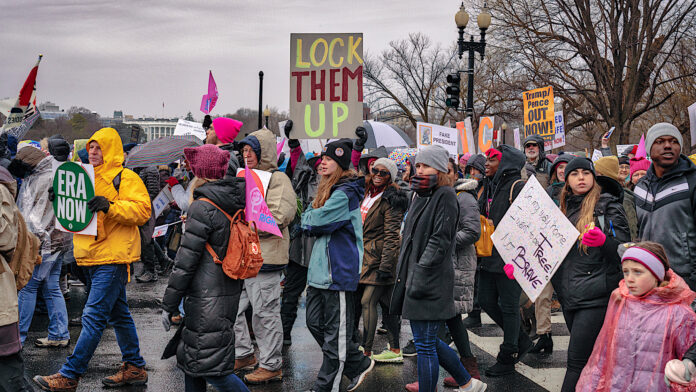Survivors of sexual assault are facing the uncomfortable conundrum of having to choose between two presidential candidates accused of sexual misconduct.
Both President Donald J. Trump and his Democratic challenger Joe Biden face sexual misconduct allegations. Several assault victims say they’re feeling obliged to choose between two powerful men who may both have abused women.
“When it comes down to it, our only choice is between two men who are credibly accused of predatory behavior….I normally wouldn’t choose either of them because of that,” said Jordana Girard, a Pace University student and sexual abuse survivor who will be voting in her first general election.
According to the Center for Disease Control’s 2015 National Intimate Partner and Sexual Violence Survey, 25.5 million women and 2.8 million men in the United States report that they’ve been victims of completed or attempted rape.
Sexual misconduct accusations suddenly lost power
Sexual misconduct allegations have abruptly lost power to oust those accused of abuse, several sexual assault survivors and advocates argued. Both Trump and Biden have been strangely quiet about these accusations of late.
Some argue that sexual assault and the #MeToo movement haven’t been taken sufficiently into consideration as campaign issues.
RK, a New Jersey father and sexual assault survivor, believes that even expressing discomfort with the voting dilemma may be criticized, as listeners charge that such accusations must politically motivated.
“No one is surprised when politicians are accused of rape or assault,” said RK. “It makes it easier for people like Trump and Biden to say allegations are fake. They reduce serious accusations to simple acts of political leverage. Our [survivors’] credibility is automatically called into question only because we stand up to powerful people.” [outquote]
“Our credibility is automatically called into question only because we stand up to powerful people.” — A New Jersey father and sex assault survivor
“Sexual assault shouldn’t be a partisan issue,” Girard agreed. “Sharing your story shouldn’t be a political statement, or align you with one party.”
Survivors are not only faced with a difficult choice, but also with their own trauma, and with potential criticism from both sides.
Accusations against both candidates
Biden has faced scrutiny over his past interactions with women, as well as over his insistence that he has nothing to apologize for.
In March 2020, former U.S. Senate aide Tara Reade accused Biden of sexually assaulting her while she worked for his office in 1993. Biden emphatically denies Reade’s claims. He also faces additional claims that he inappropriately touched or invaded the personal space of eight women, including Reade, in ways that made them uncomfortable.
Biden’s subsequent apology video was criticized as a “non-apology apology,” prompting Biden to say he would do better in the future. Biden later told CNN that he was “not sorry for anything that I’ve ever done.”
At least 26 women have accused Trump of sexual misconduct. A flood of women came forward in 2016 with their accounts of the president’s alleged misconduct. Many of these accusations were made public in the “Access Hollywood” tapes of the same year, in which Trump could be heard bragging about grabbing women’s genitals in 2005. The most recent accusation was made by former model Amy Dorris, who accused Trump of sexually assaulting her at the 1997 U.S. Open tennis tournament.
Trump’s legal team denies every claim against him as “fabricated.” The president’s standard rebuttal is that his accusers’ claims are politically motivated.
Dorris voiced her frustration with Trump’s accusers being themselves accused of lying.
“I’m sick of him getting away with this,” Dorris said, in a September 2020 interview with The Guardian. “I’m tired of being quiet. It’s kind of cathartic. I just want to get this out. And I want people to know that this is the man, this is our president. This is the kind of thing he does, and it’s unacceptable.”
Is anyone listening?
Alexandria Anderson, an Oklahoma City sexual assault survivor and survivors’ advocate, agrees with Dorris. She believes that Trump and Biden are still able to hold positions of power because of a larger issue plaguing Washington: a lack of accountability. That’s been particularly true for white men.
“It seems that as long as abusers hold positions of power, we can’t do anything to hold them accountable, she said. “Our [survivors’] calls for justice are dismissed.”
Anderson and other survivors argue that an overarching lack of understanding of sexual assault and survivors’ needs enables figures like Biden and Trump to stay in power.
“Someone can be a president or a Supreme Court justice, even when they’re credibly accused of rape,” she said.
“Someone can be a president or a Supreme Court justice, even when they’re credibly accused of rape.” — Oklahoma sex assault survivors’ advocate Alexandria Anderson
“Cycle of gaslighting”
Sexual assault survivor CT claims that the ebb and flow of sexual misconduct allegations can force survivors to relive their traumas.
“It’s a formulaic cycle,” she said. “Allegations come to light, calls for justice are made, the accuser is discredited, and then it’s forgotten within about a week.”
“It’s a formulaic cycle. Allegations come to light, calls for justice are made, the accuser is discredited, and then it’s forgotten within about a week.” — a sex assault survivor
CT, who lives in Brooklyn, NY, and who also counsels other sex assault survivors, believes that sexual misconduct allegations are ignored once they’re no longer major news events.
She calls that phenomenon a “cycle of gaslighting.”
“Sexual misconduct allegations are eventually swept away,” she said. “Those in power make us undermine our own thoughts and the legal system. We can only play by their rules.”
“We [voters] are lied to…we’re told that politicians’ crimes weren’t as bad as we make them out to be,” Anderson concurred. “So we wait until the next scandal comes out, only again to be told it’s not bad enough to warrant an investigation.”
Survivors, then political pawns
The #MeToo movement’s emergence into global politics in 2018 briefly put power into the hands of sexual assault survivors. Thousands publicized allegations of sex crimes they said were committed by powerful men – an outpouring that signaled that numerous women had been the victims of sexual misconduct.
Two years on, though, sexual assault victims feel their stories are suddenly being ignored, to minimize both presidential candidates’ alleged abusive behavior towards women.
Many consider #MeToo to be a Democrat-backed movement, because of Democratic politicians’ condemnation of U.S. Supreme Court Justice Brett Kavanaugh, who had been accused of sexual assault by three women.
Such accusations were front and center in major media in 2018, when Kavanaugh was nominated by to the Court by Trump and, despite the allegations, confirmed.
To survivors, the Democratic Party’s radio silence on the allegations against Biden is telling. RK expressed frustration over what he sees as the #MeToo movement being “postponed” for the election.
“One moment the parties are treating survivors like chess pieces. The next moment they’re sweeping allegations under the rug when a presidential candidate faces accusations,” he said. “It really shows they care more about their party than they do about powerful figures causing harm.”
“Being a ‘survivor’ is something we’re taught to correlate with us being resilient after a hopeless situation, rather than being a ‘victim,’” Anderson said. But we’re constantly met with hopeless political situations, like the allegations surrounding this election’s candidates.”
“The status quo tells us [survivors] to move on no matter what and never grieve our experiences,” she added. “We’re considered beneficial if we share our stories when it’s convenient — and [expected to] stay silent when it’s not.”

